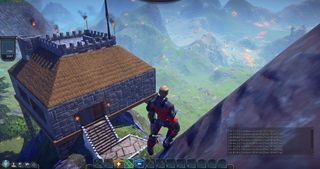SOE's John Smedley: content-driven MMORPGs are "unsustainable"

After I had reached the highest level in Star Wars: The Old Republic, I ran into a problem: I had seen and done everything the endgame had offered me. I completed all the dungeons, conquered all the available raid encounters, and then I was essentially stuck in a content drought until BioWare released something new—and then the cycle would repeat again. It's a pattern most MMORPGs of today run the risk of falling into as players tear through content at a faster rate than ever before. In a blog post , Sony Online Entertainment CEO John Smedley examines these content-driven tendencies of the MMO genre, calling them "unsustainable" for the industry in favor of more sandbox experiences.
"The content-driven model is not where we should be aiming as an industry," Smedley writes. "As players, our ability to beat that content has gotten to the point that most content is done by the players nearly immediately after it's released. As a game maker, players are going through the content we make so much faster then we can make it that we're constantly in a state where our players are looking for stuff to do."
Smedley points to the changing landscape of the MMO genre and the initial wide-eyed fascination of open-world, large-scale multiplayer gaming nearly a decade ago as the reasons why focusing on building content for players became the go-to choice. The success of this method reached a zenith with the titanic success of World of Warcraft and Blizzard's focus on keeping its endgame fresh with major update patches and expansion packs.
"We all as game makers have to deal with the fact that we're not just competing with the content of WoW at launch, we're dealing with nine years of it," Smedley explains. "That's a very daunting task, and it makes the genre unapproachable if people try and fight that fight."
Rising quality standards and a community becoming increasingly acclimated with what to expect from a polished MMO—engaging quests, an expansive world, and long-term endgame plans—are quickly diminishing the effectiveness of a content cycle, Smedley believes. Even titles with a deep, lore-rich background such as The Old Republic and The Elder Scrolls Online run the risk of losing players due to burnout.

Smedley's solution, then, is to reach across the spectrum and place the onus of creating content squarely in the player's hands. He points to a number of existing activities—PVP arenas, auction houses, armor and appearance costumes—as examples of players taking charge in forming custom experiences, but his ultimate vision entails entire games with a sandbox slant and a genre weaned away from kill-collect-loot-repeat questing and stagnant endgames.
"Building systems into the games that let the players interact with each other in new and unique ways gives us the ability to watch as the players do stuff we never anticipated," Smedley writes. "We'll see a lot more creativity in action if the players are at the center of it."
PC Gamer Newsletter
Sign up to get the best content of the week, and great gaming deals, as picked by the editors.
EverQuest Next and its world-building tool Landmark are, of course, a prime example of what Smedley is driving at. Landmark is completely player-driven, and its blank-canvas nature empowers players to create and show off constructions an entire MMO playerbase can enjoy.
And that definitely makes a difference. Most player interactions in today's MMOs are homogenized. Everyone partakes in the same quests. Grouping up is sometimes a wordless affair as you kill a quest monster together and then silently part ways. It's easy to look at another high-level character and predict that their leveling experience was more or less the same as yours. I'm all for a fresh crack in this mold, but it might be a long time before we start seeing a bit more daring in the way MMOs are made. The typically staggering costs of development has caused the genre and the developers associated with it to be notoriously averse to change.
"We're going to take the idea of sandbox gaming and put it at the core of everything we're doing," Smedley declares. "We'll obviously still be making awesome stuff for players to do, but we're going to aim very high in terms of letting players be a part of the game's systems. The more emergent sandbox style content we can make the less predictable the experience will be."
For more of Smedley's thoughts on sandbox MMOs, check out his blog and our interview with him on Landmark's ongoing alpha.
Omri Petitte is a former PC Gamer associate editor and long-time freelance writer covering news and reviews. If you spot his name, it probably means you're reading about some kind of first-person shooter. Why yes, he would like to talk to you about Battlefield. Do you have a few days?
Most Popular








